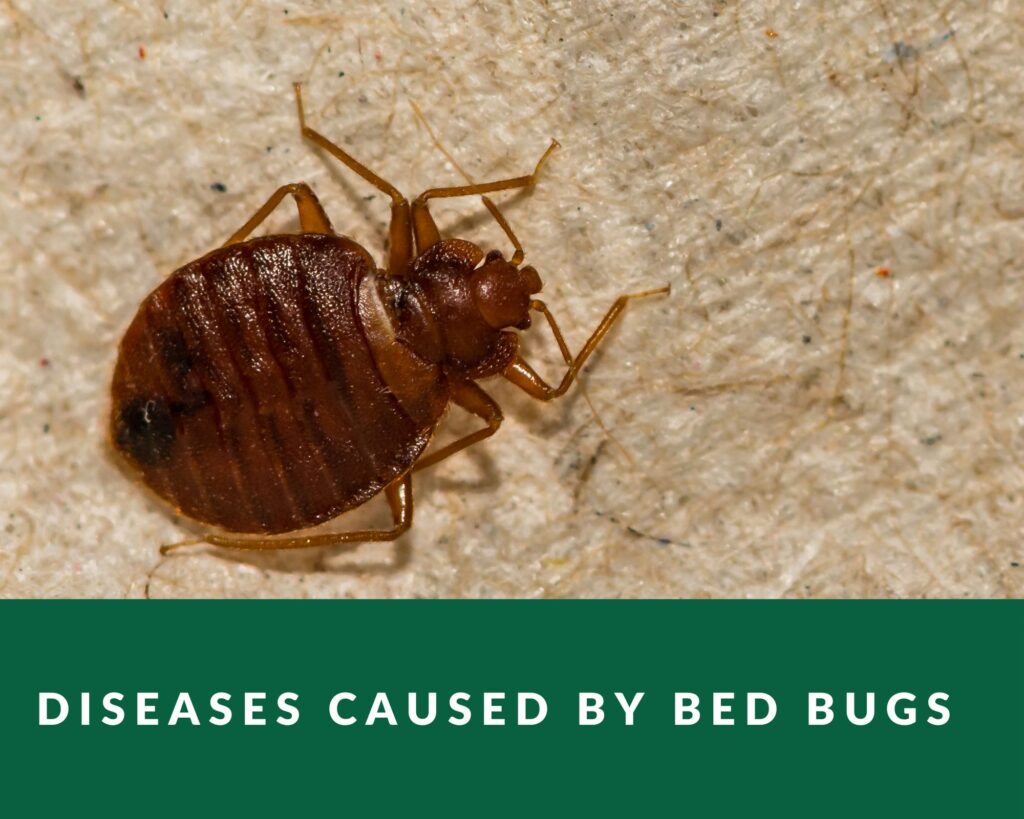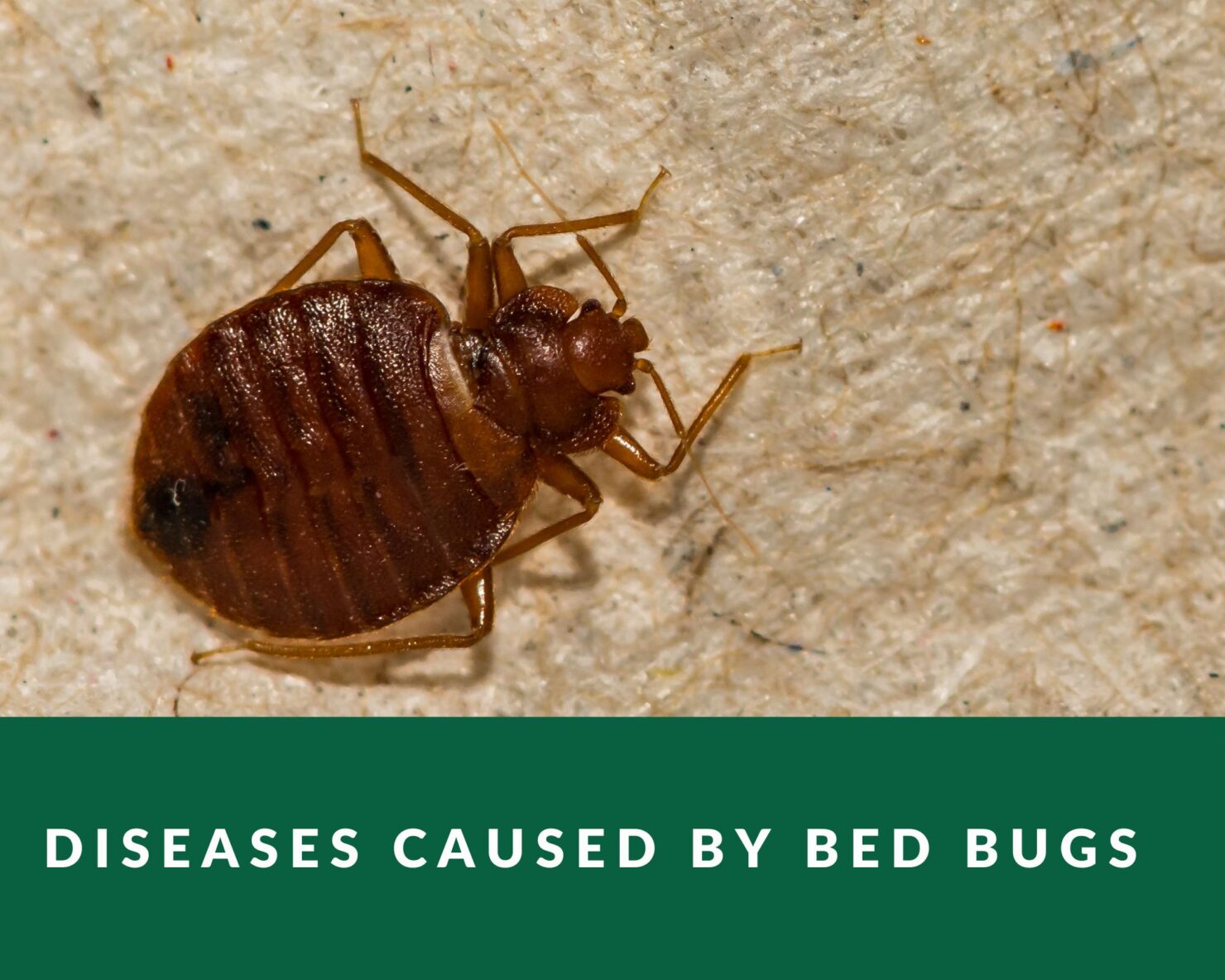Recently, there has been a lot of discussion around the proliferation of bed bugs. What used to be a nuisance that was hardly observed in economically advanced countries is now an issue affecting more and more people. Don’t fall into the trap of believing you are immune to diseases caused by bed bugs infestation.

Do bed bugs spread the disease? you might be curious to know. Yes, they do. Even though it hurts to cope with itchy bug bites, the viruses they can be harboring are even worse.
Can bed bugs carry disease?
Despite not spreading diseases through their bites, bed bugs are known to harbor viruses on their bodies.
Bed bug bodies have been shown to contain more than 45 different pathogens, including bacteria, viruses, protozoa, and much more.
Fortunately, these bacteria don’t grow or multiply inside or on top of the bed bugs. There is currently no evidence to show that bed bugs spread these infections to people.
Health Risks of Bed Bugs
While bed bugs do not transmit diseases, they can cause a variety of health problems for people who are exposed to them. Here are some of the potential health risks associated with bed bugs:
A. Physical harm from bed bug bites
Skin irritation and allergic reactions
Bed bugs often leave itchy, red welts on the skin, which can become infected if scratched excessively. In some cases, people may also develop an allergic reaction to bed bug bites, which can lead to more severe symptoms such as swelling and difficulty breathing.
B. Health risks for people with allergies
Anemia
In rare cases, repeated bed bug bites can lead to anemia, a condition in which the body does not have enough red blood cells to carry oxygen to its tissues. This is more likely to occur in people who are already anemic or have other underlying health problems.
Secondary infections
Scratching bed bug bites can break the skin and create an entry point for bacteria, leading to secondary infections such as impetigo or cellulitis.
C. Mental health impacts
Anxiety and insomnia
The presence of bed bugs can cause significant psychological distress, as people may become anxious about sleeping in their own beds and experience sleep disturbances as a result. This can lead to insomnia, which can have a range of negative health effects.
Psychological distress
The presence of bed bugs can cause significant emotional distress and social stigma for people who are affected by them, which can have a negative impact on their overall well-being and quality of life.
Diseases caused by bed bugs
More than 40 human diseases have been linked to bed bugs, yet there seems to be little proof that this has ever actually happened.
According to scientific research, bed bugs are potential carriers of diseases such as yellow fever, tuberculosis, recurrent fever, filariasis, smallpox, yellow fever, and Chagas disease.
There are no known instances of bed bugs inflicting disease on people right now. However, bed bugs still have the ability to carry disease-causing pathogens in its body.
Chagas disease can be transferred by bed bugs, according to research and laboratory tests. The possibility exists even if such a spread has not yet been recorded.
Chagas disease
Chagas disease, which is brought on by a pathogen, is one of the diseases caused by bed bugs. The pathogen is discovered in the bug’s poop and frequently in its saliva when it is infected.
The insects excrete on the skin of the human or animal they bite after consuming blood, or vice versa. If the pathogen is present in the spit of the bed bug, you could become ill immediately after you are bitten.
When you move while you sleep or touch the bite, a parasite that is exclusively present in the excrement can enter the bite and establish a dwelling in your body.
The absence of many early indications of Chagas disease is its major downside. Prior to actually experiencing heart failure or significant digestive issues, it targets the heart and digestive system, and a person may not even be aware that anything is happening.
Symptoms of Chagas
The symptoms may be minor or potentially fatal.
- Fever
- Fatigue
- Swollen lymph nodes
- Body aches and pains
- Rash or hives
- Cardiac abnormalities
- Gastrointestinal problems
Hepatitis B Virus
Bed bugs feed on blood but do not transmit blood-borne diseases such as HBV, HIV, or hepatitis C. While bed bugs can potentially carry disease-causing pathogens, studies have not shown that they are capable of transmitting these pathogens to humans.
Symptoms of HBV
- Fatigue
- Abdominal pain
- Loss of appetite
- Nausea and vomiting
- Joint pain
- Jaundice
Tularemia
Recent studies suggest that bed bugs which commonly infest bed bugs and bite humans are capable of transmitting tularemia from an infected to a healthy mouse. Tularemia is a bacterial infection caused by the Francisella tularensis bacterium. Tularemia is typically spread through exposure to infected animals (such as rabbits or rodents), bites from infected ticks or deer flies, or through contact with contaminated water or soil.
Symptoms
- Fever
- Chills
- Headache
- Muscle aches and pains
- Skin ulcers
- Swollen lymph nodes
- Difficulty breathing
Other likely diseases caused by bed bugs
There are numerous claims that bed bugs carry diseases. While it is false that bed bugs transmit the following illnesses, they are believed to do so:
- Q-fever
- Leprosy
- Sores or brucellosis
Prevention of bed bugs
Get rid of bed bugs as soon as you discover any or believe they are there. With time, a minor infestation can develop into a serious one.
Think about the following advice for bed insect prevention in your house:
- Always declutter.
- Keep your personal items separate from other people’s possessions by placing them in a plastic container.
- Keep an eye out for bed bug indications in public spaces like resting rooms, store rooms, and furniture, as well as other places where people congregate.
- Daily vacuuming will help you catch bugs. And also cultivate the habit of disposing of vacuum bags outside in a trash can.
Prevention of Bed Bug-Related Diseases
Prevention of bed bug-related diseases is also important. To reduce the risk of infection, it is essential to:
- Avoid scratching bed bug bites
- Wash bites with soap and water
- Use antihistamines and topical creams to relieve itching
- Seek medical attention if symptoms of the disease develops
Treatment of Bed Bug-Related Diseases
Treatment of bed bug-related diseases varies depending on the specific disease. In general, treatment may include:
- Antibiotics to treat bacterial infections
- Antiviral medications for Hepatitis B
- Prescription medications to manage symptoms of Chagas disease and Tularemia
- Hospitalization for severe cases
What Next?
If you discover that bed bugs are biting you, you should occasionally seek medical attention. Make sure to schedule a visit with your doctor if you notice that you have skin irritation or a severe allergic response. A doctor might also be able to give you very effective and reliable treatment.

